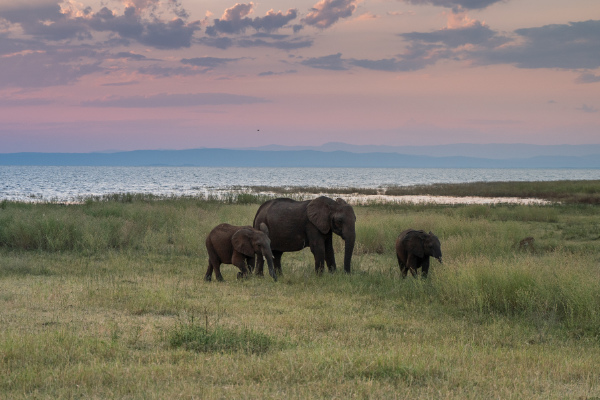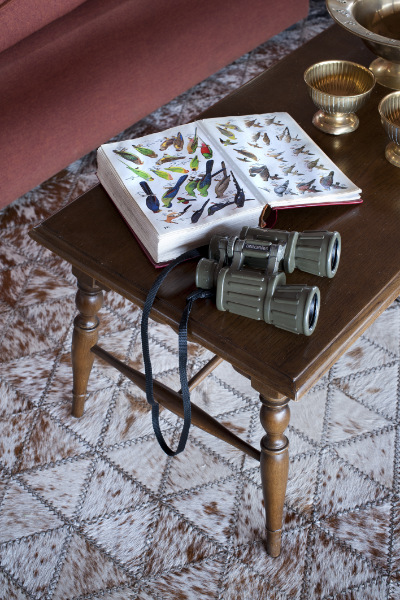Beks Ndlovu was a safari guide in Zimbabwe before starting African Bush Camps in 2006. Fast forward to today and the company has 18 luxury tented camps and lodges in Botswana, Zimbabwe and Zambia, all with a strong focus on conservation. The company’s Foundation has spearheaded 72 community projects across southern Africa, and by staying in their camps, you make an active contribution.
1. How did you get into guiding?
2. Most old safari hands say that Zimbabwe has the best guides. Why is this?
3. What are some of your most vivid guiding moments?
4. When/how did you make the decision to switch from guiding to building camps?
5. What are the differences between the destinations where ABC operates?
6. How does ABC have a positive impact?
7. What next?
8. What one safari experience should everyone enjoy?
How did you get into guiding?
As a child I would see visitors entering Hwange to see the wildlife on my doorstep. I spent most weekends and holidays with friends in safari camps, camping, fishing, and learning about life in the bush. When those friends were doing apprenticeships at safari camps, I had the opportunity to go and volunteer. I received and welcomed guests from all over the world and spent time with experienced guides, learning how they tracked wildlife. I was so intrigued by how they would go to certain places, read the habitat, allow it to tell a story and inform them which animals were present. When I left high school, I started training as a guide and, in 1999, acquired my Professional Guiding Licence.
Most old safari hands say that Zimbabwe has the best guides. I'm sure you agree! Why is this?
Traditionally, Zimbabwe had a really rigorous system for training guides, involving a four-year apprenticeship under the guidance of a seasoned professional, and with the requirement to log experiential hours in activities like canoeing and game driving. Zimbabwe's approach set a high standard and, as a result, the country’s guides gained a stellar reputation and were highly sought after across Africa. While Zimbabwe's system was the template, other countries have since introduced their own excellent training programmes, and there are now exceptional guides from all corners of the continent.
What are some of your most vivid guiding moments?
There are so many! Tracking lions on foot in the sandy Kalahari-like terrain of Hwange National Park was incredibly thrilling; observing paw marks in the early morning after hearing their calls during the night. Another exceptional experience was following elephants on foot through the acacia forests on the floodplain of the Zambezi River. Spending time with these gentle giants in such a beautiful setting was unforgettable. Living on the water's edge of Lake Kariba and tracking black rhinos daily was another cherished highlight. Sadly, due to poaching, there are no black rhinos left in the area, but I'm hopeful that concerted conservation efforts may bring them back.

When/how did you make the decision to switch from guiding to building camps?
I’ve always loved seeing the absolute joy and happiness on the faces of guests when they really appreciate nature. Seeing that made it so much more real for me, and that’s when I thought, ‘How can we take this further?’. Now we have an army of guides and staff with the same passion, vision, and philosophy. We make a positive impact on the places our team come from and they, in turn, impact the people they guide and host.
What are the differences between the destinations where ABC operates?
We have camps in some of Africa’s most beautiful places, all of which offer different experiences, vegetation, wildlife and culture. Desert regions such as Makgadikgadi and Nxai Pans are home to incredible zebra migrations. The Okavango Delta offers water-based experiences, with guests able to explore by mokoro dugout canoes and see water-adapted species like sitatunga. Chobe, in the Linyanti area, has an amazing river running through it. Thorntree, part of the African Rift Valley, connects Mana Pools and the Lower Zambezi, with floodplains and river systems leading to the Zambezi River.
How does ABC have a positive impact?
We established our African Bush Camps Foundation because we know, through responsible tourism practices, that we can create a meaningful and lasting change, benefiting both the environment and the people living in these special places. Our primary objective is to make a positive impact in the communities where our camps are located, focusing on education, community empowerment, and conservation. We now offer impact safaris that seamlessly blend the luxury safari experience with a unique opportunity to immerse yourself in the local community.

What next?
Our latest camp, Khwai Lediba, in Botswana’s Khwai concession, has been met with an overwhelmingly positive response. Our next venture is Atzaro Okavango Camp, opening in the Okavango Delta in March 2024, which promises to elevate the safari experience to new heights, offering guests an unforgettable journey into the heart of nature. In addition to this, we are working on completing our Zambian circuit, which includes Thorntree in Livingstone and Lolebezi in the Lower Zambezi. Our ambitious vision is to incorporate South Luangwa and Kafue, and possibly the north of Zambia.
What one safari experience should everyone enjoy?
The essence of a truly remarkable safari experience, in my view, lies in embracing slowness. Safaris should be about savouring the moment and immersing ourselves in the natural world. A slow safari experience allows us to appreciate the beauty of nature in its purest form. When you’re observing wildlife from a mokoro dugout canoe in the Okavango Delta, for instance, the absence of noise and pollution heightens the senses. In moments like this, we can truly connect with nature, hear our own breath, and appreciate the tiniest sounds and sensations around us.
Interview by Tom Barber
